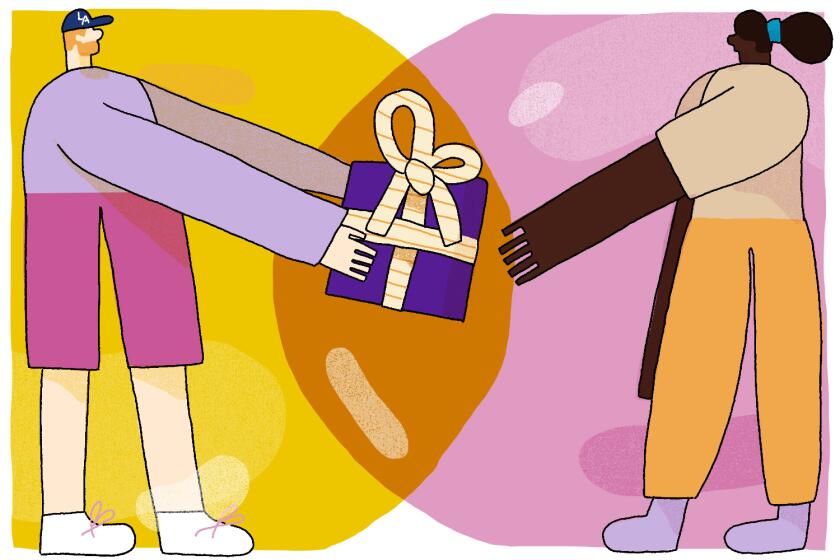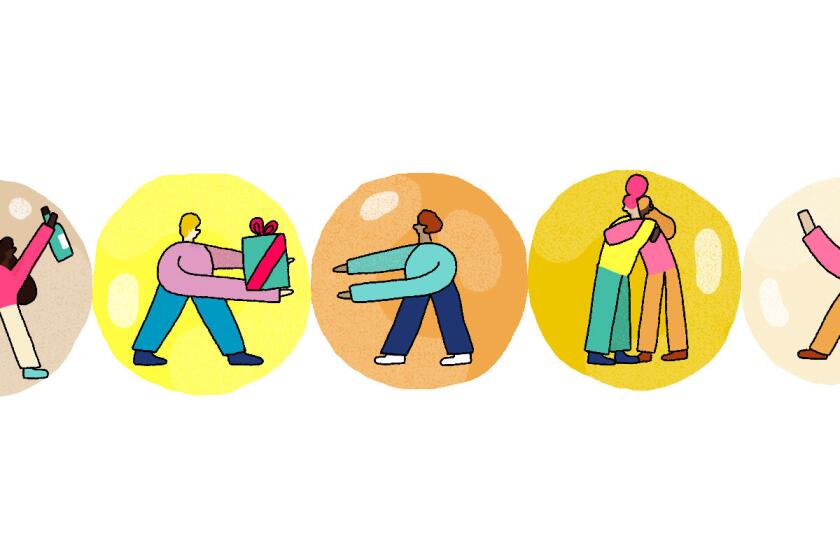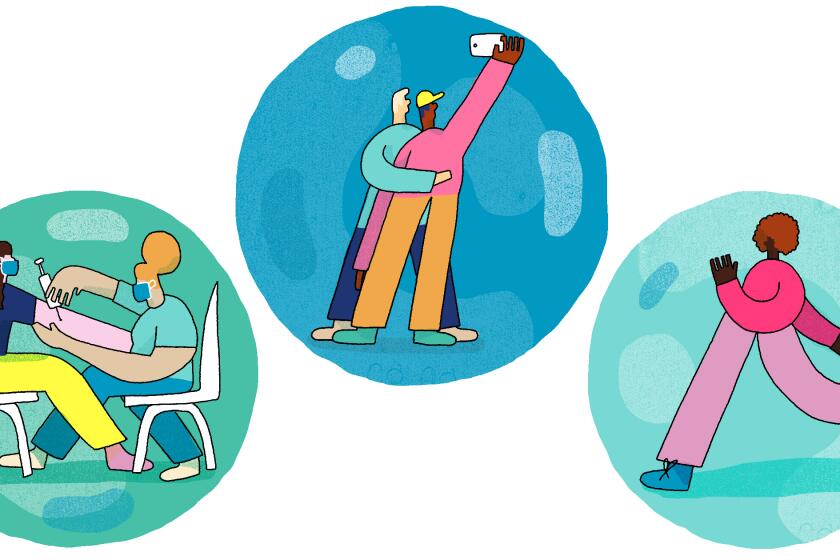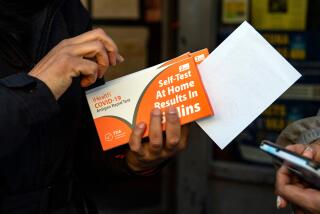How to set ground rules — about COVID vaccines and more — ahead of holiday gatherings

- Share via
For this year’s holiday gatherings, Zoom meetings are out and big tables loaded with turkey — or bibingka, or tamales, or latkes, or all of the above — are back. But while you’re excited about reuniting with relatives and friends, you might also worry that some of the people coming to your home may be unvaccinated. Or as an invitee, you might be hesitant to attend a gathering where you don’t know everyone else’s vaccination status.
A recent Harris Poll found that vaccination status is likely to influence how individuals celebrate the holidays. Taken in September by more than 2,000 U.S. adults, including more than 1,400 who identified as vaccinated, the poll found that half the vaccinated respondents were “extremely or considerably hesitant to spend the holidays with unvaccinated family members or friends.”
A majority of respondents also said they would take increased precautions when attending gatherings where only some of the guests were vaccinated; a small percentage would skip the gatherings altogether.
With that in mind, you might be wondering how to respectfully ask your guests to keep one another’s safety in mind — whether it’s about vaccines, testing, having the meal outdoors or when to wears masks.
Dr. Curley Bonds, the L.A. County mental health department’s chief medical officer, said don’t be apologetic when making safety requests as a host or, when you’re a guest, asking about the vaccination status of other attendees.
For the record:
5:29 p.m. Nov. 22, 2021A previous version of this article misstated the title of Dr. Curley Bonds as L.A. County’s chief medical officer. He is the chief medical officer of the county’s Department of Mental Health.
“This isn’t a decision about whether you want to spend time with them,” he said. “It’s more about wanting to be safe, and I think it’s really important to be honest about that.”
Just the thought of having those conversations can be nerve-wracking. Here are some suggestions from Bonds and other experts about how to convey your concerns with respect — and, with luck, without setting off an argument about government mandates, individual liberties or horse de-wormer.
The 2021 holidays will be much different from 2020 thanks to the COVID-19 vaccines. But we aren’t quite back to normal. Here’s what you should know.
Manage your expectations
Although most people are at least partially vaccinated, keep in mind that there are still many people who aren’t. As of Nov. 11, The Times reported, a little more than 30% of Californians hadn’t gotten a single COVID-19 vaccine shot.
Another thing to think about is that we’re all coming to this conversation with not just different viewpoints, but also different experiences from this pandemic — having severe symptoms from COVID-19 or none at all, losing a loved one to the virus or not knowing anyone who’s contracted it.
Jennifer Kresge, a family mediator with a focus in neurology, said we also need to recognize that most people enter into a situation or conversation with the desire to find meaning in the moments. In different ways, the search for meaning directs our conversations and affects our ability to enjoy one another.
Normally, Kresge said, we want to avoid confrontation in these conversations, so we search for the meaning by asking questions and exploring each other’s experiences.
“If we can engage in a way that also stimulates others’ as well as our own interests, we set the stage for empathy, compassion, and connection,” she said.
Add some rapid COVID-19 tests to your holiday shopping list. Once you’ve got them, here’s what you should know about how, when and why to use them ahead of Thanksgiving, Hanukkah, Christmas or other holiday gatherings.
Set inclusive ground rules
“I think when you make the invitation, it’s good to include [unvaccinated guests] and say, ‘We are gathering for the holidays and we’d love to have you join us, but, we just want to make sure everybody’s safe,’” Bonds said.
With that statement, you’re already setting the tone for the conversation — signaling that you want to include everyone but also that you’re going to set rules.
Be clear from the start what your rules are. For example, you could require people to wear masks indoors unless they’re eating and drinking. Or maybe you’ll have a spread of food inside but ask everyone to eat outside.
The cardinal rule, Bonds said, is to avoid being judgmental.
“This isn’t the time to get into big elaborate debates about ‘why you haven’t gotten vaccinated.’ You want to be respectful,” he said.
Leave politics out of the conversation. This is about enjoying your loved ones safely.
Alternatively, if you’re the person who’s feeling left out because of your lack of vaccination, Bonds said, work with your host on an arrangement that satisfies you both.
Hanging around outside in Southern California for Thanksgiving or other holidays? Your stay-warm strategy shouldn’t be ski jackets and layering. Focus on your ears, feet and tush.
Don’t burn bridges
Ted Andrews, a family mediator, said to remember that this conversation isn’t a verdict on you or your relationship.
“We are deeply polarized,” Andrews said. “And even though this conversation will be between two people, our minds are so packed with tweets and posts that anything said will bounce off this clutter and take us somewhere unintended.”
He advises to keep the future in mind and ask yourself, “Should a negative impact of this conversation outlast COVID-19?”
“Families and friends can outlast politics and pandemics,” Andrews said.
Be patient, Kresge added; listen, and agree to disagree if you can’t concur, offering affirmations and empathy with respect and in a principled way.
“Success requires us to be willing to experience discomfort as we learn to communicate with one another and make deeper efforts to understand the other person’s perspectives and choices,” she said.
This is the second holiday season amid the COVID-19 pandemic. Here’s what to consider before you get together with family and friends to celebrate.
Before you hang up or stop texting
Say thank you for the dialogue — and if you’re the guest, the invitation — before ending the conversation.
Andrews said it’s surprising what people remember after a conflict. A little word can have a big impact.
So whatever the outcome, he advises to express gratitude and say why you appreciated the chance to get together with them, that they are important to you, and that you look forward to seeing them in the future.
During the holidays especially, Kresge said, we have the challenge of learning to cooperate over more than just setting the table.
“I hope as your mind wanders and wonders how you will survive these holidays, you will also find a means to explore common ground, creating interest and meaning, focusing on what you share and what you can appreciate about one another,” she said.
And remember, if you’re not ready to mingle while COVID is still in the air, it’s perfectly OK to decline an invitation.
COVID holidays are here again. Now that we know more about the coronavirus, what can we worry less about?
More to Read
Sign up for The Wild
We’ll help you find the best places to hike, bike and run, as well as the perfect silent spots for meditation and yoga.
You may occasionally receive promotional content from the Los Angeles Times.
















